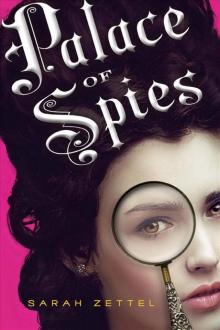- Home
- Sarah Zettel
Sword of the Deceiver
Sword of the Deceiver Read online
Sward
of the
Deceiver
by Sarah Zettel
a division of F+W Media, Inc.
The book is dedicated to my loving and supportive husband, Tim.
Contents
Chapter One
Chapter Two
Chapter Three
Chapter Four
Chapter Five
Chapter Six
Chapter Seven
Chapter Eight
Chapter Nine
Chapter Ten
Chapter Eleven
Chapter Twelve
Chapter Thirteen
Chapter Fourteen
Chapter Fifteen
Chapter Sixteen
Chapter Seventeen
Chapter Eighteen
Chapter Nineteen
Chapter Twenty
Chapter Twenty-one
Chapter Twenty-two
Chapter Twenty-three
Chapter Twenty-four
Chapter Twenty-five
Chapter Twenty-six
About the Author
Also Available
Copyright
Acknowledgments
This book was a little tougher than usual to get out. I’d like to thank my editor, Jim Frenkel, for his much needed assistance and patience. As ever, I also had the unflagging help of The United Writers’ Group, and I’d particularly like to thank Anne Harris, who put her finger on the heart of so many problems.
Chapter One
It was the season of dust.
The sky was copper with dust. Dust smeared the white cotton of Natharie’s plain skirt and breastband. Dust rose in a plume from the distant road as some messenger rode pell-mell for the river bridge. Dust clung to her sweating skin; the itch and smell of it filled her nose until she could taste it in the back of her throat. The whole world was an oven and only the flies danced.
Despite this, Natharie strode joyously through the shin-high grass, her bare arms swinging and the white skirt flapping around her knees. Today was her nineteenth birthday; today Natharie would at long last be declared a woman.
Queen Sitara, Natharie’s mother, followed her, all her gold chiming and glittering in the hazy sunlight. Four of Natharie’s sisters, Oma, Shu, Vikka, and Rasura — younger than she, yet women already — walked with their mother, all swaying hips and superior airs. Behind her blood family walked Natharie’s aunts, cousins, maids, attendants, and nurses. Anun, the rough, round, bawdy captain of the women’s guards, strode with them, her voice rising in a hoarse bellow over their clear song. Even the old nun Sathi followed Natharie today, and Natharie stretched out her long legs, determined to keep ahead of them. Little Malai, Natharie’s youngest sister and the only remaining girl-child of the family, took the excuse of the festive occasion and ran, only half a grinning, giggling step behind Natharie.
It was all Natharie could do to keep from laughing as her smallest sister’s high, panting voice struggled to get out the words of the womanhood hymn that rose up from the glittering procession.
The grain full ripe falls to seed the earth.
The grain will grow up toward the sun.
The girl gives birth to the woman, who gives birth to the world.
So turns the wheel, until Heaven is achieved.
In the traditional way of things, Natharie’s womanhood ceremony would have been held when she was thirteen or fourteen. Mother’s had happened when she was only nine. No one could become a bride until they became a woman, and this was why Natharie’s ceremony had been so long delayed. Treaty obligations written before Natharie was even born gave her, the king of Sindhu’s oldest daughter, to the king of Lohit. When the old king found himself widowed, he had sent for Natharie, but her parents had demurred and delayed, for one year, and another, and still another after that.
Now, the old king was dead, and Natharie was finally free from her extended childhood. Free to claim the rights and the obligations of womanhood, and of her own home and a new land to go with it. The new king, Pairoj, waited for her to become his bride.
The girl gives birth to the woman, who gives birth to the world.
So turns the wheel, until Heaven is achieved.
The women of the procession were the only color in the dust-brown world. Their silks and linens made them a river of color in the pale grassland: scarlet, sapphire, emerald, silver, gold, diamond white. Even Captain Anun had laid aside her uniform for a gown of amethyst and silver. Tia, Natharie’s ancient nurse, had been stitching the emerald threads onto her red cotton skirt for over a month now.
“My mistress will only become a woman once in this life,” she’d said with a grin. Natharie had hugged her then. Neither one of them had been sure Tia would survive long enough to see this day. Because she had never been declared a woman, Natharie’s childhood servants had stayed with her for far longer than the usual time. Now they would all be gone. That was the hard part of this day, thought Natharie. So many familiar faces and presences would be given other places, or paid their final pensions and returned to their family homes. A woman did not need the same tutors, servants, and possessions as a girl. Especially when she would shortly be sent to her husband’s home. Natharie pushed that thought away. Later there would be time enough to worry about the future. Not, she told herself, that there was much to worry over. Pairoj’s letters held the promise of a bright and considerate husband. After all, her mother had come from Lohit to be queen of Sindhu and found here a good life and a kind husband. She knew this must be a day of endings as well as beginnings. That was as it should be. Natharie lifted her chin and lengthened her stride. She would not go afraid. She would go with her eyes open.
Beneath her sloping bank, the sacred river, Liyoni, was low, flat and brown. The passing boatmen were black shadows who raised their hands to the brightly colored procession as the current carried them swiftly past. She pushed her way through the chattering reeds that lined the riverbank. The dried edges grazed her skin. Warm mud squelched between Natharie’s toes and tugged at her sandal heels with loud, sloppy kisses. A trio of ducks, offended by their noisy passage, burst into the air, complaining as they flew.
Natharie’s mother and the other women set down their baskets and, singing still, surrounded her.
The wheel turns life to birth to death to life.
The wheel turns girl to woman to widow to girl.
Take her hand, O! Awakened One!
Open her eyes as yours were opened and lead her from the wheel to Heaven.
Anun the guardswoman grinned like a tigress and stripped off Natharie’s white skirt and breastband. Tia crowned her tangled hair with the golden flowers. Oma, Rasura, Vikka, Shu, all of them, crowded around her and draped more garlands around her shoulders, kissing her and laughing as the bright petals fluttered down to stick to her arms and the backs of her hands. Malai hung garlands on Natharie’s wrists and hugged her big sister hard. Natharie was a little surprised at the tears that came so quick and strong to her eyes as she returned the little one’s embrace.
Lastly, Mother came to wrap the girdle of white chrysanthemums around Natharie’s waist. Then she stretched up on tiptoe and kissed her forehead. Fate had declared that Natharie should have all her father’s height. Where Mother was tiny, slender, and straight-hipped, Natharie was as tall as most men, with a broad, curving body, and arms and legs hardened by the playing and fighting she did with the female guards who looked after Mother and the concubines. There were many jokes whispered among Natharie and her sisters about … accommodations her future husband might have to make because of her size.
Mother stepped back to let old Sathi, the only other one here wearing white, hobble forward. Natharie held still and found that, for all her deli
ght, solemnity came easily. After this day, her new life would begin in earnest. She needed this blessing as she had never needed any other. The challenge of her size was the least of what she had to face.
Someone handed Sathi the clay bowl of henna and jasmine. The nun raised it up to the coppery sky and began the hymn of departure in her cracked voice.
Let the way begun again be the way of peace.
Let the horizon that is seen again be seen from the calm and generous heart.
Let the eyes be open to see Heaven and the Awakened One and all the Blessed.
The familiar voices all took up the hymn, spinning the words over and over again until Natharie felt dizzy. Sathi dipped her withered fingers into the henna and Natharie stooped down so the nun could mark her brow with signs of tranquillity and the turning wheel of time. Then Sathi passed the bowl to Tia, and took Natharie’s hand. The ancient nun led Natharie into the river. Boatmen called out blessings as they passed. Natharie found she was shaking a little.
Let the way begun again be the way of peace.
Let the horizon that is seen again be seen from the calm and generous heart.
When the water was up to Natharie’s breast, Sathi turned, grasped Natharie’s shoulders, and shoved her down into the water.
The water roared as it swallowed Natharie. There was no time to draw in extra breath. The world below was brown and shifting and silent. Water, sand, and silt filled her eyes and ears. Shadows scattered and sunlight sparkled through the brown water. Her blood pounded in her ears. She tried to hold still, but it went on and on, and she kicked at the sand underneath her, but Sathi held on tight. She grabbed at the wiry fingers, trying to pry them loose, but Sathi still held her.
All at once, Sathi let go, and Natharie shot up into the air, gulping in deep, whooping gasps of air, and of the water that fountained off her, which made her cough and gag and gasp again. Sathi embraced Natharie, and led her — a woman grown now, and still coughing gracelessly — back to shore where the other women still sang for her.
Let the new heart bring peace in the time of hardship.
Let the new voice bring wisdom in the time of darkness …
Natharie coughed out the last of Liyoni’s waters and pushed her streaming hair out of her face. Then she froze, ankle-deep in river water, her face warm with sudden wonder.
A horse stood atop the bank. He was pure black without trace of paler color, so shining and perfect he might have been a polished statue. His mane flowed like silk, and were it not for the wind that blew it back, it would have hung down almost to his knees. He tossed his head at her, stamping his hoof as if in greeting.
Natharie’s jaw dropped open. The thought flitted through her mind that her father had sent this beautiful creature as a womanhood gift. But the other women all turned as well, and they too froze like stone. Now Natharie could see that the horse was surrounded by a crowd of men. Three were wrinkled things in flowing red robes with high, curving gold hats that they had to keep clutching to prevent the wind from blowing them into the dust. Their hands were full of scrolls and gold rods and other shiny things that they kept dropping as they tried to keep their hats on. They looked like busy little brown monkeys next to the beautiful black horse. All but one. That one stood tall and stern, his great arms folded, frowning down on the world. Smaller monkeys, boys she saw now, scurried around their red-robed masters, picking up what they had dropped, dusting it all off. The red monkeys shouted and pointed and sent the boys scuttling off on new errands, to the palanquin bearers and other dust-caked servants who waited behind them, to other men in plain robes bearing tablets and styluses, who bobbed and scribbled while the red monkeys held on to their hats and shouted at each other.
The men behind looked much more imposing. They stood in neat formation, four rows of five. They wore armor that glittered like fish scales. They carried long spears and wore curving swords at their hips. Bows and quivers of arrows had been slung over their shoulders. One young man led them, his face stern, his eyes cold with anger. Not at her, she thought in the odd, slow moment of her staring at him, but at the men in red. Beside him, on a smaller horse, sat a single woman in a plain white dress carrying a white staff as the soldiers carried their spears.
They were not her father’s men. All of them — the red monkeys and the soldiers, the boys, the secretaries, the bearers and that one woman in white — stared at the women and naked Natharie with the dripping flower garlands disintegrating on waist and shoulders.
A horse. Red-robed … priests. Soldiers. Natharie knew what she saw, and knowing made her blood run cold.
Hastinapura. They’ve come back.
The soldiers’ leader met Natharie’s eyes, drew himself up a little taller, and the moment broke. The world exploded into motion. Anun shoved Malai behind her. The women on the shore scattered, clutching the wealth they’d brought for Natharie. Mother charged forward with the red dress that should have been wrapped ceremonially around Natharie and tossed it over her to cover her nakedness. Anun shouted something. Natharie snatched up little Malai, tossed the girl across her shoulder, and began to run. Mother saw that she held Malai, and with her skirts hiked up around her knees, she ran past. Natharie heard women’s screams, the boisterous sounds of men’s laughter, and shrill shouts that could have only been the red priests’. She thought she heard Sathi shouting, but she could barely breathe, let alone understand what was being said. It took all the breath she had to find her stride to get Malai and herself back to safety.
Rusara, Vikka, and a few of the others had caught up with them, and they all ran together. Natharie’s head spun but she had no breath for asking questions. She could only clutch at the red cloth with one hand and her little sister with the other and try to keep running.
They reached the edge of the rice fields. Laborers cried out to see their queen and her maids racing through the brown grass and only belatedly fell to their knees. A horn sounded. Men, soldiers — Father’s soldiers — poured across the canal bridges and surrounded all the women.
They must know what is happening. Natharie set Malai on her feet and hugged her close, relieved that her little sister was too short of breath to ask questions she did not have wit or wind to answer.
Mother was talking fast, giving orders. Anun was rattling off descriptions and numbers to the soldiers and orders to the women’s guards who arrived at a dead run with them. Behind the first flood of soldiers came a troop of bearers with a double palanquin. Mother boosted Malai into it, and Natharie scrambled in behind while Anun snatched a spear out of the hand of the nearest guardswoman to take her place beside them.
“Hurry!” Mother called to the bearers, and they did. They lurched and rocked so badly, Natharie was afraid they’d be thrown out. Poor Malai huddled on the floor, hugging their mother’s knees. Mother wrapped one arm around her daughter and gripped the canopy support with the other, her face grim and her jaw clenched tight.
Natharie clutched the nearest canopy pole, suddenly, childishly incensed at what had been ruined. She had waited years for this day. She was supposed to be covered in women’s finery — gold and jewels and perfume. She was supposed to be walking through the streets in her gilded sandals while the people showered her with flowers.
She was not supposed to be running from the priests of the northern empire and their barbaric sacrifice.
When they reached the dark wood and gilt walls of the palace, the gates were already open. Father, King Kiet of Sindhu, waited there, his craggy face taut with fear and fury. The bearers barely had time to set them down on the palm-lined lawn before Mother leapt out to grab his hands.
“The horse … from Hastinapura,” Mother gasped. “The emperor’s horse.”
“I know. We had a messenger.” Father covered her long hands with his square ones.
“Why now?” she demanded. “Chandra has been on the throne four years, why does he send out the horse now?”
When Father just shook his head, Mother covered her fac
e. “Ah! Why not yesterday? Why today?”
Ancient Tia had come up to the side of the litter, wheezing from the run, and was tugging at Natharie’s arm. “Come chil … Natharie. You cannot be seen like this.”
But defiance filled Natharie and she stayed where she was. Malai slipped up to her, grasping her hems.
“What’s happening?” the little girl demanded. “Tell me!”
Father looked at her, and Natharie swallowed as she saw the unspoken order in his eyes. Her first duty as a woman had come. She wrapped her arm around Malai’s thin shoulders. “We cannot talk of such things here.”
Malai pulled back, belatedly aware of how many people filled the yard — secretaries, servants, soldiers, merchants, farmers, all sorts of people kneeling before the royal family with their heads pressed against the dusty ground, but with their ears wide open. She straightened herself up and tilted her chin up. Showing all the angry dignity an eight-year-old girl could muster, Malai turned on her heel and walked toward the doors of her palace home with her nurse fussing behind her.
Mother pressed Natharie’s hand. “There will be an audience,” she said, and quickly turned to Natharie’s sisters and the other women.
Natharie felt light-headed. A strange buzzing filled her ears as she walked slowly, carefully to her own chamber. There, her maids greeted her with fuss and flutter and a hundred questions.
“There will be an audience,” she said, hearing her own voice only at a great distance. “I must be ready.”
To their credit, her women stopped their questioning. They hurried forward with basins and cloths, to clothe her properly in red and gold, to wash her skin with cool water, to comb and dress her hair and make it ready to receive the high golden cap that was her crown as eldest of Sindhu’s royal daughters.
While they worked, Natharie stared out of the great arched windows leading to her balcony, overlooking the gardens, the fields, and the river beyond. She was looking along the bank for dots of white and red. She saw nothing but the roots of the white mountains that held up the sky.

 Laurel
Laurel A Mother's Lie
A Mother's Lie Playing God
Playing God Dust girl
Dust girl Sword of the Deceiver
Sword of the Deceiver Let Them Eat Stake: A Vampire Chef Novel
Let Them Eat Stake: A Vampire Chef Novel Dust Girl: The American Fairy Trilogy Book 1
Dust Girl: The American Fairy Trilogy Book 1 The Usurper's Crown
The Usurper's Crown For Camelot's Honor
For Camelot's Honor Camelot's Blood
Camelot's Blood Kingdom of Cages
Kingdom of Cages Fool's War
Fool's War Golden Girl
Golden Girl A Sorcerer’s Treason
A Sorcerer’s Treason The Firebird's Vengeance
The Firebird's Vengeance A Taste of the Nightlife
A Taste of the Nightlife Assassin's Masque (Palace of Spies Book 3)
Assassin's Masque (Palace of Spies Book 3) Reclamation
Reclamation Bad Luck Girl
Bad Luck Girl Under Camelot's Banner
Under Camelot's Banner Palace of Spies
Palace of Spies Dangerous Deceptions
Dangerous Deceptions Quiet Invasion
Quiet Invasion In Camelot’s Shadow: Book One of The Paths to Camelot Series (Prologue Fantasy)
In Camelot’s Shadow: Book One of The Paths to Camelot Series (Prologue Fantasy)